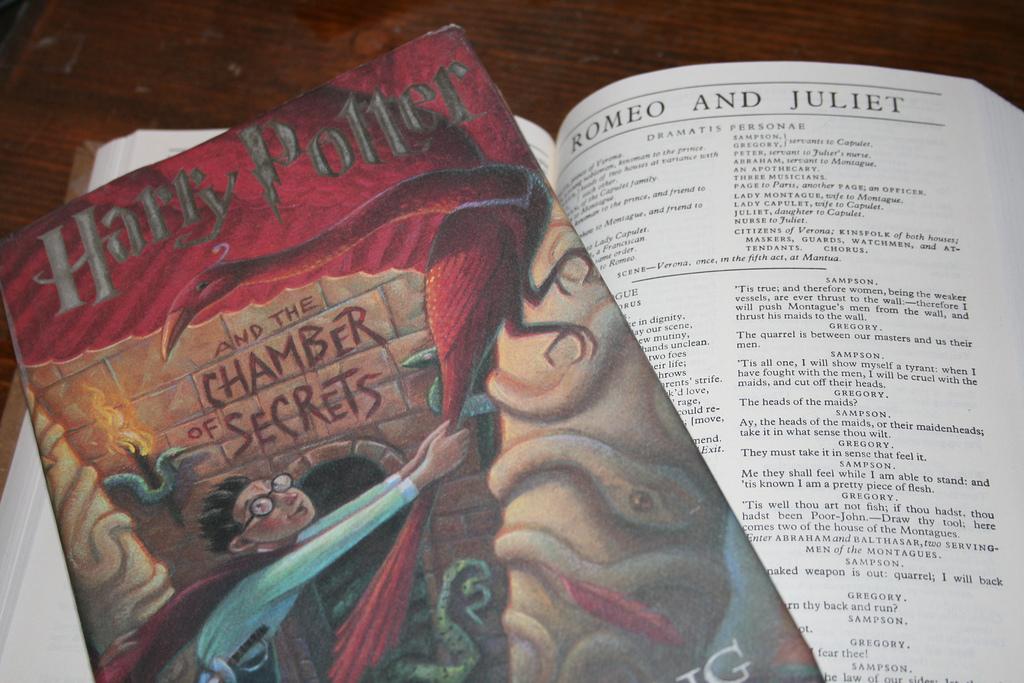3 A. M. Musings: Are Literature’s Greatest Turning in Their Graves?
n the future, the Harry Potter books may be the new classics, like what Romeo and Juliet and the Great Gatsby are now. (Illustration by Craig Calefate/The Observer)
May 26, 2011

Published: August 30, 2007
As I sit here looking over the book list for this semester, I find myself cringing at some of the titles and wondering if Shakespeare is turning in his grave at the sound of my whining over having to read “Titus Andronicus.”
At the time of their writing, what we now call “classics” were the popular fiction—the Harry Potter novels—of their day. At the time of their printing, they served as guilty pleasures or a way to while away a rainy afternoon. Theatergoers eagerly anticipated the next Shakespearean work to hit the stage, the literary crowds read with rapt attention the newest publication of F. Scott Fitzgerald, and the politically-minded willfully debated the works of Jonathan Swift. For most people today, however, these names conjure ideas of laboring over incredibly grandiose language, absurd questions about the symbol of the green light, and jokes with punch lines that were probably funny at the time but now generate puzzled looks.
If I had to take a guess, I would have to say that Shakespeare was not sitting at his desk, quill and ink in hand, sadistically penning “Romeo and Juliet,” knowing that, in the future, thousands of students around the world would sit in classrooms being tortured by a line-by-line dissection of the manuscript. More than likely, he sat at his desk hoping that audiences would be captivated by the tragically beautiful story and be deeply moved by the love of two young people.
I’ve seen and enjoyed the play and the movie and have probably even used a monologue from the work as an audition piece at some point. I don’t hate Shakespeare (If I did I wouldn’t have enrolled in Professor Bly’s Shakespeare, Film and Media class), but sitting in a classroom in high school and discussing the most minute details makes me loathe The Bard’s existence in the world. And that, not the death of Romeo and Juliet, is the greatest tragedy.
It’s not just Shakespeare that has met this cruel fate. Oh no, most of literature’s greats are despised by the students enrolled in English 101 who are forced to look for the deeper meaning behind the green light at the end of the dock (I’m referring to the non-English majors of course, since English majors actually enjoy hour long discussions on the meaning of the green light in “The Great Gatsby”). The majority of students, however, will despise the day that the light bulb went off in Fitzgerald’s head and found its way into the text.
(As a side note, this book is not a part of my semester’s required texts, and I’m not sure why I’m antagonizing Fitzgerald, who is actually one of my favorites. With that said, I will try my darndest to leave him and his green light alone.)
As a different example, how about a story most of us met in some form when we were kids—“Gulliver’s Travels.” Okay, on the surface, you have a guy whose boat gets shipwrecked and who finds himself in a land where the people are only 6 inches tall, then later ends up in a land where he is only six inches tall. Cute story about discovery and diversity, right? Far from it. Undercurrents of political and religious issues abound and were great points of contention among the readers in Swift’s day. People sat around and debated the meaning behind the words (Swift was a satirist, so he usually meant something far different than what he actually wrote) and Swift’s stand on religion and other issues of the time. People did this with great fervor, and many a spark flew with the publishing of Swift’s works.
In the classroom, students trudge through the text, not quite getting the supposedly hysterical joke (although Dr. Boyle did his best to explain so students could join him as he chuckled at a line), and often requiring a brief history lesson in order to actually understand what the hell was going on. But Swift’s contemporaries got the joke and caught the references to the happenings of the day without having to stop and read the explanation in a footnote or hope for a clarification at the next class meeting. And so they did not cringe at the thought of reading the novel.
Authors write with the intention of providing their readers with a pleasurable experience. I doubt that Shakespeare anticipated his work being used as a standard text for English classes, or that Fitzgerald masterminded the green light in order to provide teachers with an essay question for the final exam, or that Swift wrote knowing that scholars would pore over his work centuries later, still finding new meanings in the text (although Swift is probably a poor example, since the speaker in one of his works boasts that seven scholars could look at his work for seven years and each come up with a different interpretation). I wouldn’t be surprised to learn that some of these authors were turning in their graves at the discovery that their works are thought a form of torture by some.
The writers we study today were The New York Times Best Sellers of their day and it is unfortunate that they are now equated with textbooks, essays and nights stretching long past 3 a.m.
If the same fate is met by today’s best sellers, students in the future may be asked to discuss the meaning and symbolic aspect of the lightning bolt-shaped scar on Harry Potter’s forehead.













